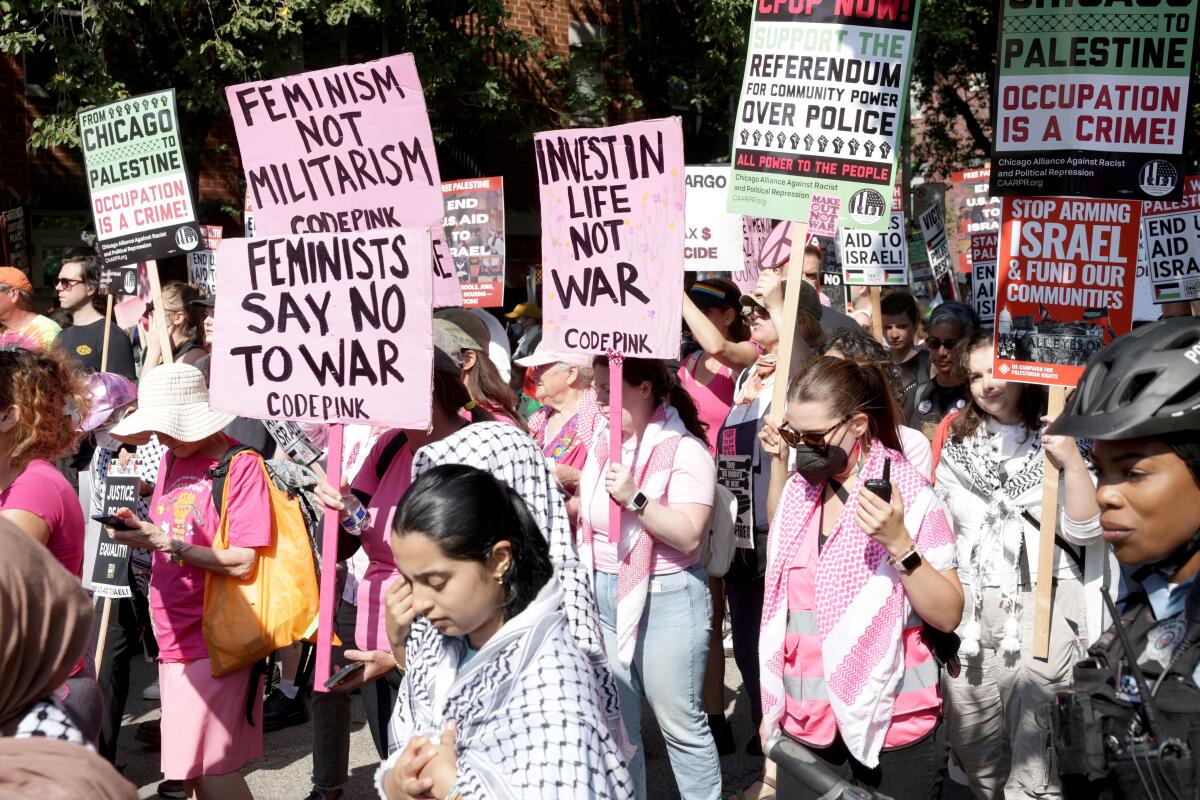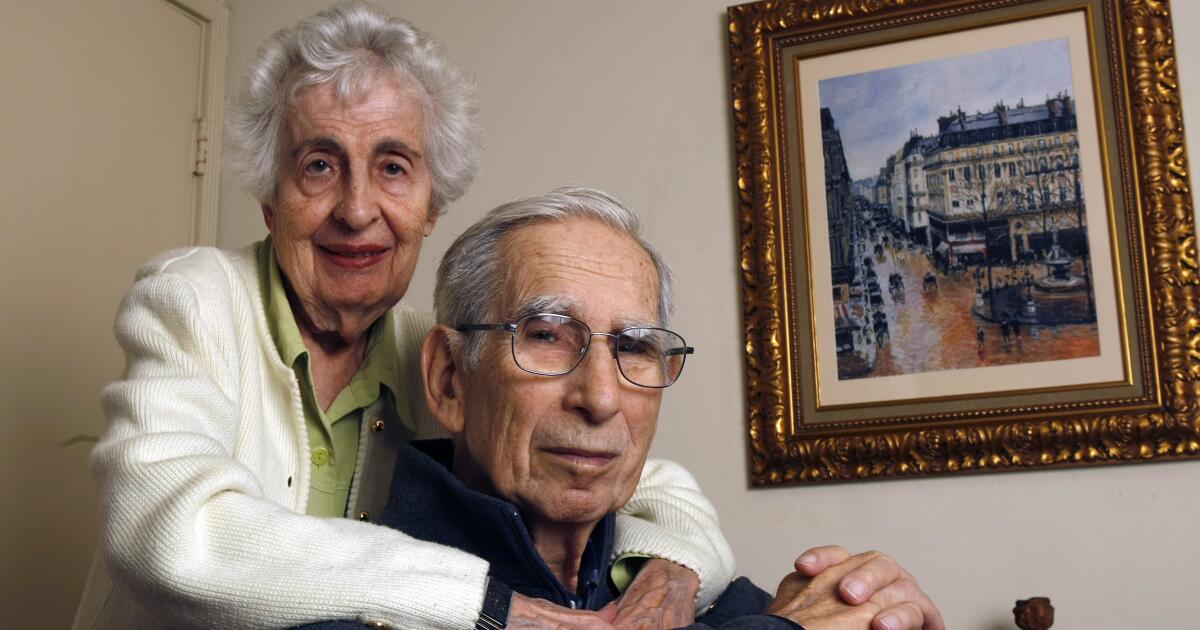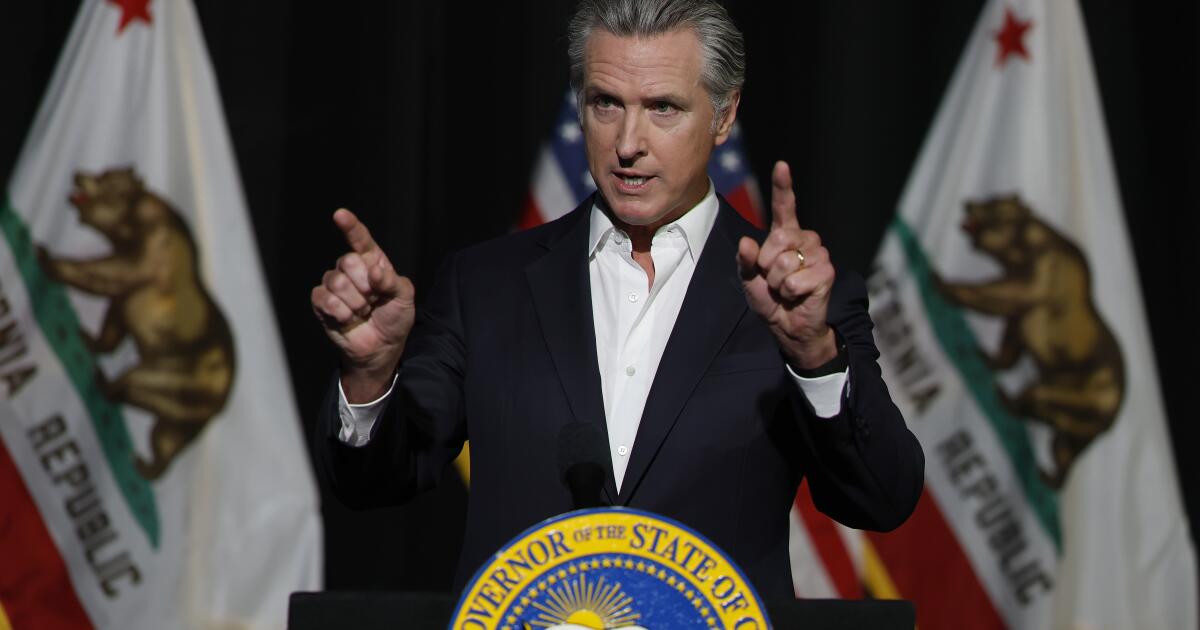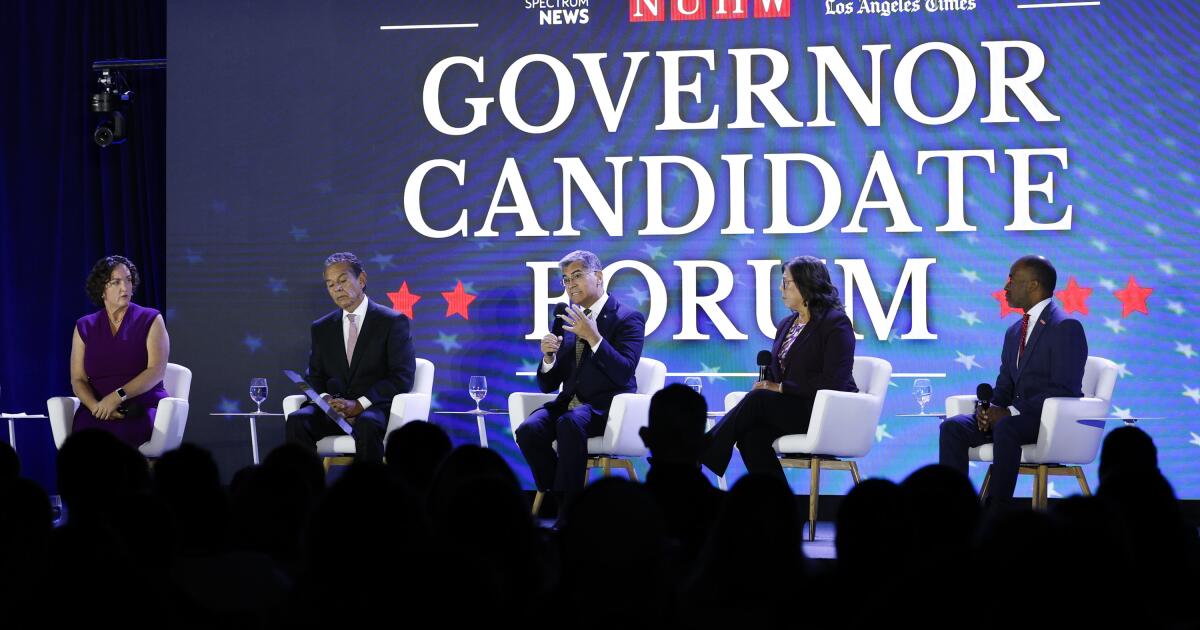CHICAGO —
As Democrats from across the country convene in Chicago to officially crown Vice President Kamala Harris as their nominee, another group descended on the city in protest of the Biden-Harris administration’s actions in the Israel-Hamas war — a sharp reminder of the divisions that still dog the party despite a show of unity for its new candidate.
About 3,000 protesters gathered in Chicago’s Union Park on Monday morning, carrying signs reading, “Stop the War,” “We’re trying to help you, Kamala” and “Abandon Harris ’24.”
“Harris, Harris, you can’t hide,” they chanted as they set off toward the United Center to voice their frustration with the Biden-Harris administration. “We charge you with genocide.”
One protester held up a giant, garish caricature of Harris and President Biden, with fangs pointing from their angry faces. Harris’ hand held a sign that said, “Billions in US aid.”
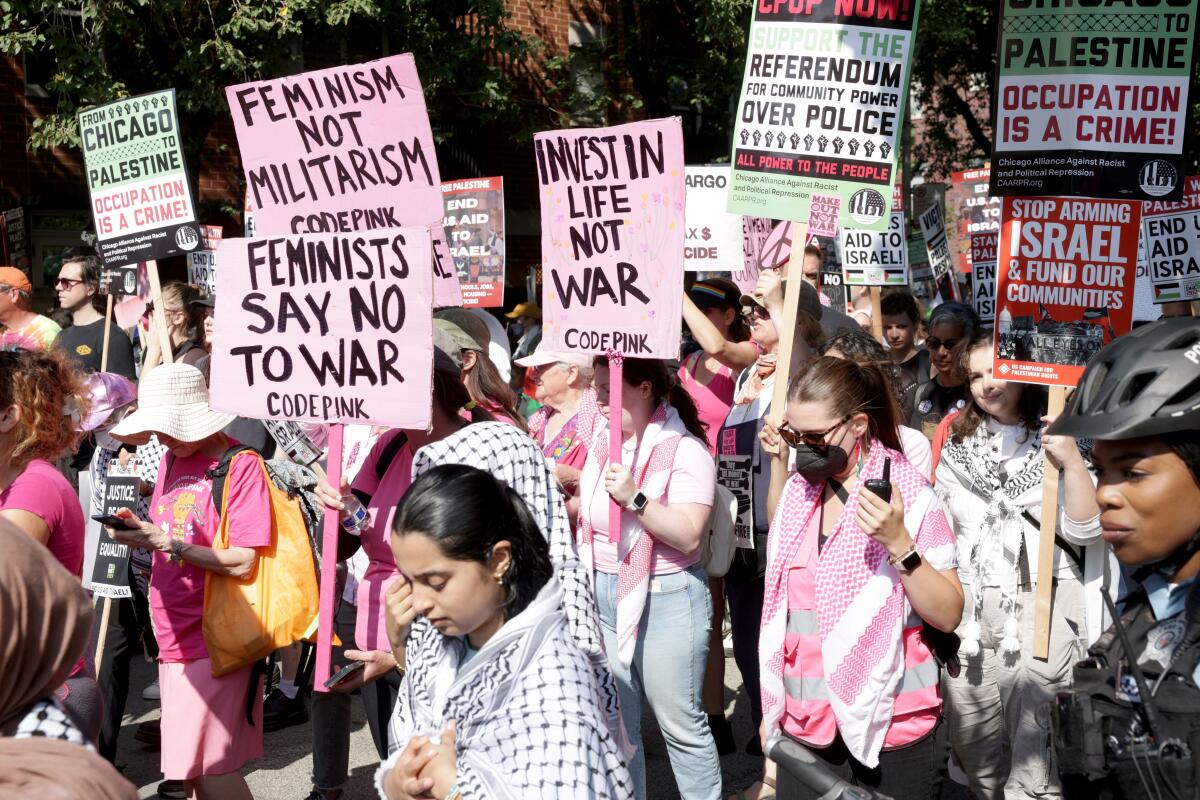
Protesters demonstrating in Chicago on Monday denounce U.S. support for Israel in its war with Hamas in Gaza.
(Myung J. Chun/Los Angeles Times)
The Coalition to March on the DNC — an affiliation of more than 200 activist groups from across the country — is planning two major protests during the four-day Democratic National Convention.
Along with Monday’s demonstration, a protest planned for Thursday will coincide roughly with Harris’ headliner speech at the convention. Several smaller protests are planned throughout the week. Organizers said ahead of Monday’s march that they expect thousands, and perhaps tens of thousands, of demonstrators to descend on the Democratic convention.
The crowd Monday was smaller than many organizers had hoped. But Hatem Abudayyeh, a coalition spokesman, said before the march started that he was pleased with the “thousands” who had turned out. He still believed that the total turnout for protests during the week could amount to “tens of thousands.”
“I love the numbers,” Abudayyeh said. “I love the diversity of the crowd. I love the passion of the crowd.”
Monday’s protest presented a platform for a variety of groups. Pro-Palestinian activists mingled with democratic socialists on the grassy park, while evangelists for Jesus preached at the crowd through megaphones and a truck occasionally drove by waving a giant Trump flag.
The march hadn’t formally begun when a small group carrying Israeli flags marched into the park. A small scuffle ensued as pro-Palestinian protesters quickly surrounded them, chanting, “Free, free Palestine!” and ushering the pro-Israeli protesters across the street.
Rows of police on bicycles quickly separated the two groups of protesters.
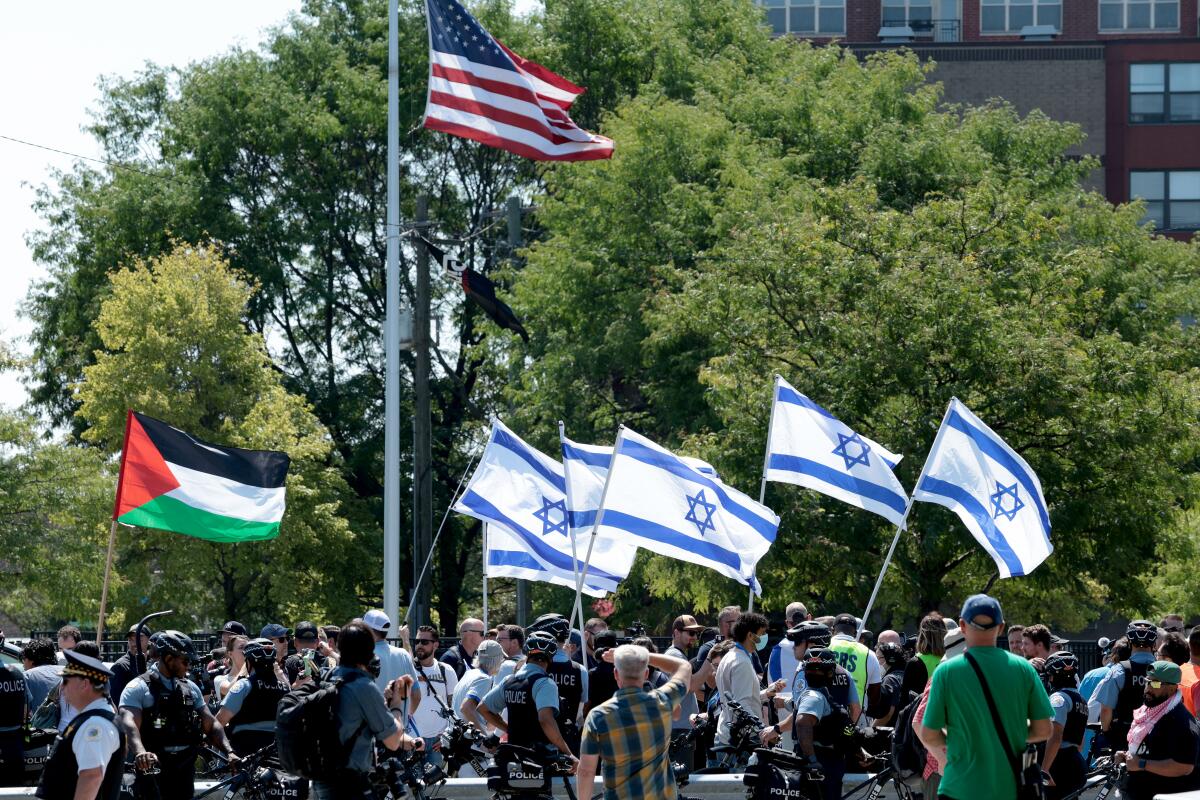
Pro-Israel supporters demonstrate near pro-Palestinian supporters at Union Park in Chicago on Monday, the first day of the Democratic National Convention.
(Myung J. Chun/Los Angeles Times)
But the vibe was largely peaceful and buoyant as the protesters gathered in Union Park ahead of the march. A couple of Muslims with kaffiyeh scarves wrapped around their heads bowed on the grass to pray.
As a small group of antiabortion activists stood in one corner of the grassy park, shouting “Shame on you!” pro-Palestinian protesters formed a circle around them and stood silently, arm in arm.
Those who showed up to protest expressed mixed feelings about Harris’ ascension to the Democratic presidential nomination. Some said they hoped she would work harder for Palestinian rights than Biden. But others held her equally accountable for what they view as the Democrats’ blind support of Israel.
“Killer Kamala’s sending bombs,” the protesters chanted as they marched down Washington Street, past lines of police using their bicycles to block access to the sidewalk. “Killing children, dads and moms.”
Jacob Smith, a 32-year-old software engineer from Detroit, joined a busload of Michiganders for the pro-Palestinian protest here. While condemning the war was his primary focus, Smith also hoped the gathering would push the Democratic Party further left on other issues, such as raising the minimum wage and fixing the housing crisis.
A registered Democrat, Smith said he planned to vote in November. But he still hadn’t decided whether he’d support his party’s nominee. Unless Harris supports a permanent cease-fire and arms embargo, Smith said, he’d probably vote for Jill Stein of the Green Party — even in the battleground state of Michigan, where Harris and Donald Trump are fighting for every vote.
“It’s definitely my responsibility to leverage my vote if I can try to stop genocide,” Smith said.
Sporting a pink bandanna and a pink “Malibu, California” hat, 68-year-old Michelle Cohn, who had traveled to Chicago from St. Paul, Minn., said she hoped she’d be able to vote for Harris, but she “can’t stand their war policy.”
“Democrats have become the party of war,” said the lifelong Democrat. “I can’t sit around and I can’t play with my little grandkids without doing something about all the other kids that are getting killed.”
That narrative was disputed by one of the counterprotesters, Daniel, who declined to give his last name. Arriving in Union Square with members of his church and other Christians for Israel, wearing an Israeli flag on his back and carrying one in the air, he said he visited Israel shortly after the Oct. 7 Hamas attack and witnessed the aftermath.
“We need to make sure that people don’t forget what the cause was — that Israel was attacked, hostages were taken, babies were murdered and slaughtered in a horrific way,” he said.
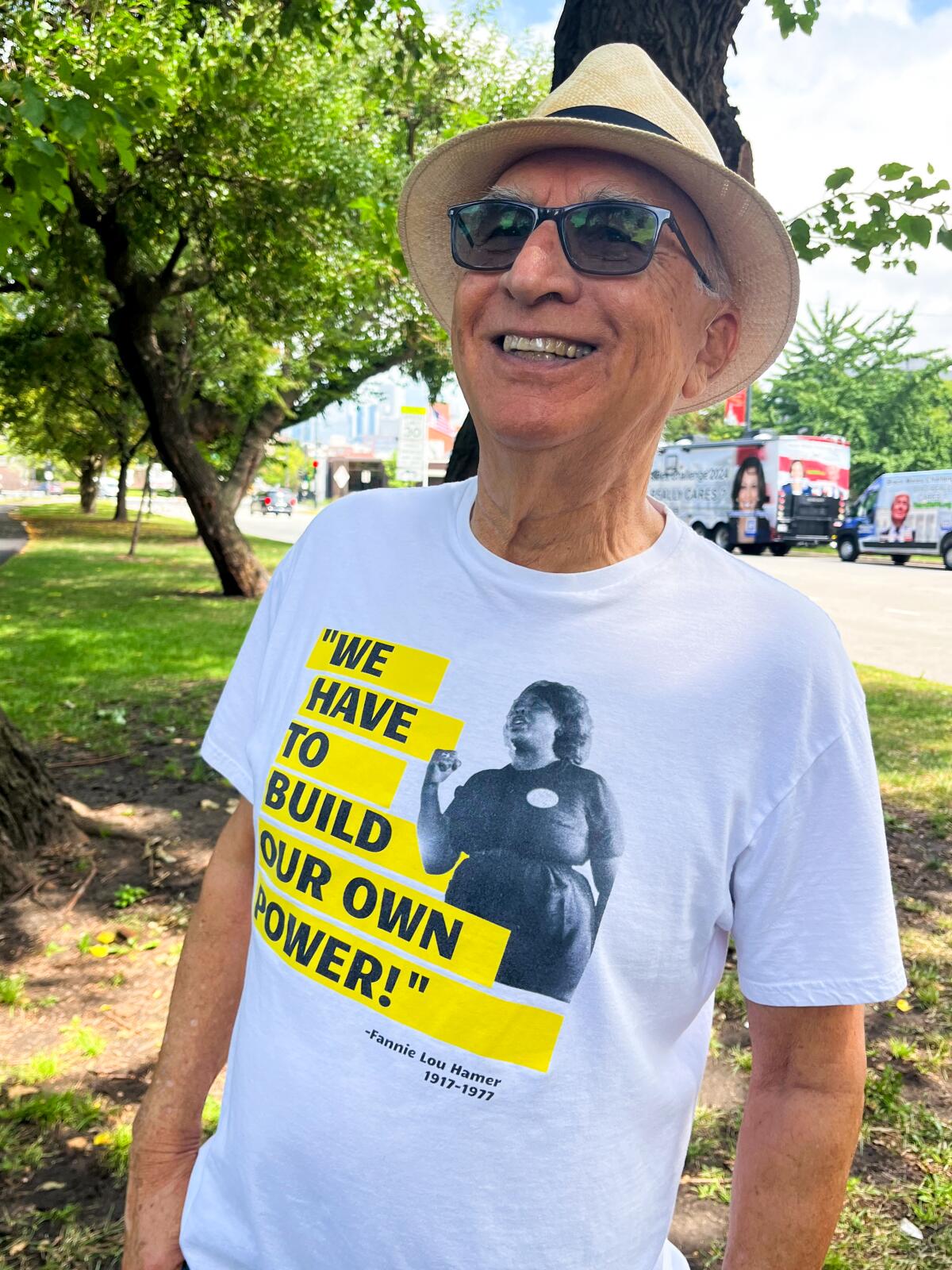
Carlos Montes, a longtime activist from Boyle Heights, traveled from California to Chicago to join protesters this week outside the Democratic National Convention.
(James Rainey / Los Angeles Times)
While many Democrats are joyfully celebrating their new nominee, parts of the party’s left flank will be focusing protests on progressive issues. The coalition is demanding that Democrats support funding for jobs, housing, health and education — not money to fund the Israel-Hamas war.
But the broad array of imperatives advocated by the marchers also includes, for example, a demand for the government to grant legal status to the estimated 11 million immigrants now believed to live in the U.S. without legal documents.

Police form a line to separate pro-Israel and pro-Palestinian protesters at Union Park on Monday in Chicago.
(Myung J. Chun/Los Angeles Times)
Marcherscame from around America, many traveling overnight Sunday in car caravans and chartered buses and by train to be in time for the noon-time start of Monday’s rally.
Wassim Hage of Oakland joined a group of about two dozens activists from the Bay Area who came to demand “a permanent cease-fire in Gaza and an arms embargo on Israel, ahead of the 2024 election.” The demands also include a cessation of the “billions of dollars of weapons funding from the United States government.”
Hage, 30, noted that Bay Area cities such as Hayward and Richmond, which passed resolutions in favor of divestment in Israel, had been in the vanguard of the antiwar movement. They protested the huge expenditures in Israel, he said, at a time when “rents are skyrocketing in our state, school teachers in San Francisco aren’t being paid on time and communities are suffering.”
“That’s an unacceptable state of affairs,” Hage said. “With billions of dollars going to bomb children in Gaza, when our own communities in the Bay, and all around California, aren’t doing well at all.”

Protesters demonstrating against Biden administration policies in Gaza take to the streets in Chicago on Monday.
(Myung J. Chun/Los Angeles Times)
The demonstrations in Chicago represent the most high profile pro-Palestinian protest efforts since a rash of demonstrations spread across American college campuses this past spring.
Organizers predicted that months of planning would result in well-managed events — staffed with an internal security team, first aid workers and volunteer lawyers to monitor interactions with police and any outside agitators.
“It’s going to be very well organized and it’s going to be peaceful,” said Carlos Montes, a progressive activist since the 1960s, who came from Boyle Heights to participate in this week’s actions. “We don’t want to reenact ’68 in Chicago, right?”
In 1968, about 9,000 to 10,000 protesters against the Vietnam War famously filled the streets of Chicago during the Democratic National Convention. The city’s police department responded with massive force and the violence that followed created indelible images, which Richard Nixon used to great effect in his successful campaign for the presidency against Hubert Humphrey.
“This time we are saying, ‘Bring your grandma, bring your kids,’” said Montes, 77, once a member of the leftist Brown Berets, a Chicano rights group.
Local leaders noted that the city had changed markedly since the reactionary administration of Mayor Richard J. Daley, who demanded a hyper-aggressive response by the Chicago police to the demonstrations of 1968.
But Monday’s organized march was smaller than the protests of 1968 and ended without major clashes, though a small group of protesters did breach a barricade, triggering an altercation with police.
The activists filed into a small park within earshot of the United Center. Onlookers and members of the press clambered onto playground equipment as protesters filled the grassy knoll.
